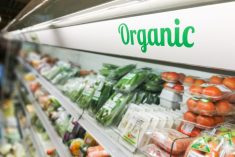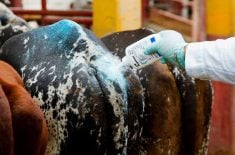Construction of a new grain collection facility and transportation hub is still on track at Northgate, Sask., near the Canada -U.S. border, but a major American grain company will not be involved in the project.
Ceres Global Ag Corp., the project’s main proponent, announced earlier this month that the Scoular Company will not be involved in funding, developing and constructing a proposed grain collection facility at Northgate.
Ceres, based in Toronto, recently terminated its arrangements with Scoular. Instead, Ceres will use its own subsidiary company, Riverland Ag, to design and develop the Northgate grain facility.
Read Also

American agriculture groups call for full renewal of Canada-United States-Mexico trade deal
American food and agriculture groups are calling for a full 16-year renewal of the Canada-United States-Mexico-Agreement (CUSMA).
Scoular is a Kansas-based grain trader that has more than 70 offices and facilities located throughout North and South America. Its global annual sales are valued at more than $6 billion.
Until recently, Scoular was expected to play a major role in the development of the new grain handling facility at Northgate.
But company officials learned in late January that their Northgate development agreement with Ceres had been unilaterally terminated.
Circumstances surrounding the termination are still being discussed, Scoular officials said last week. Details are not being released.
“This decision is disappointing to Scoular and, more importantly, is a setback for customers at Northgate who will be deprived of access to our long-established international shipping networks serving end-use customers,” said Scoular’s chief operating officer, Bob Ludington.
He said Northgate was one prong in Scoular’s much larger strategy to serve producers and end users through an extensive transportation and logistics network and an expanded grain buying presence.
“Scoular will continue to aggressively pursue that strategy in Canada and elsewhere,” Ludington said.
With Scoular out of the picture, Ceres will use its own subsidiary, Riverland Ag, to design and develop the proposed Northgate facility.
Ceres will spend an additional $17.4 million in 2014 to complete construction of the grain facility and other infrastructure, including oil and gas transload facilities.
“We looked at all the options for Northgate and concluded that building out the site, advancing the energy transload business and having Riverland design and develop the grain elevator was the best risk-return option for Ceres,” said company chair Gary Selke.
“Northgate presents an exciting opportunity for Ceres and will open a whole new logistics outlet for Canadian farmers and energy producers to markets their products in the (United States), Mexico and beyond.”
Michael Detlefsen, chief executive officer with Ceres, said the Northgate project will give Ceres an opportunity to “fundamentally retool its grain business,” transforming Riverland from a passive grain storage model to an active trading company.
“We anticipate that … enhanced Canadian grain origination direct from farmers through Northgate would ultimately feed Riverland’s end customers and drive higher volumes through Riverland’s downstream assets,” he said.
In its third quarter report to investors, Ceres said the decision to use its subsidiary, Riverland Ag, to pursue the development of the grain facility was driven by the uniqueness of Northgate’s location, which is in the heart of a wheat and oat production region.
According to Ceres, approximately 178 million bushels of Canadian grains and oilseeds are produced within 160 kilometres of the proposed facility. The location also offers access to the BNSF rail system and an ability to buy freight transport, to which no other elevator in Western Canada has access.
This site would allow Riverland Ag to deliver crops such as canola to Mexican customers in unit trains. It would also allow Riverland to develop a durum export program through its existing facility in Duluth, Minnesota.
Sweet light crude oil production in the Northgate draw area is estimated at 40,000 barrels per day.
That number could increase to 75,000 to 125,000 b.p.d. in the next three to five years, Ceres said.















